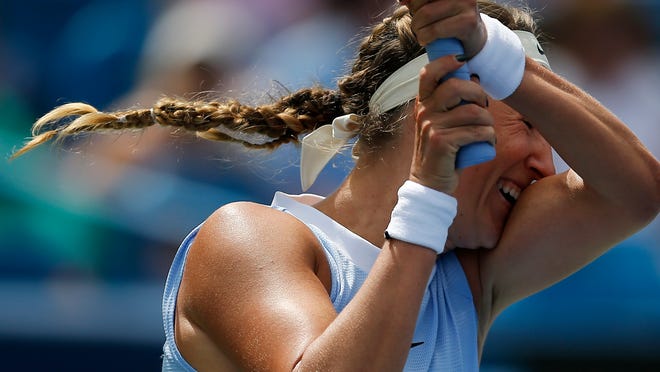
There will be someone new leading the U.S. women's gymnastics team at the Paris Olympics.
Tom Forster, the high-performance director, is stepping down at the end of the year. The announcement Wednesday comes four months after the Tokyo Games, where the Americans failed to win the world or Olympic title for the first time since 2010.
A search will be done for Forster's replacement.
"It has been an incredible honor to lead Team USA," Forster said in a statement. "Thank you to everyone who supported me during my time in this role. I look forward to supporting the next High Performance Director as they lead our wonderful women’s program.”
The position of high-performance director, previously called the national team coordinator, was created in late 1999 when the United States went to a semi-centralized system that allows athletes to live and train at home and come together for monthly training camps.
Under Martha Karolyi, the national team coordinator had complete control over the women’s program. She selected teams for the Olympics and world championships, set exacting standards for both gymnasts and coaches, and oversaw a pipeline that ensured the U.S. women had an uninterrupted line of medal-minting teams.
The U.S. women won two Olympic team titles and five world championships under Karolyi, and produced every Olympic all-around champion from 2004 until she retired after the Rio Games in 2016. But Karolyi’s harsh measures were blamed for creating the toxic culture that allowed Larry Nassar and others to abuse young gymnasts.
USA Gymnastics has tried to lessen the power of the position, but the person still has outsized influence on the Olympic aspirations of female gymnasts in the United States.
Forster was praised for creating a more positive environment for elite gymnasts, particularly at training camps. Gymnasts were not pushed to train or compete when they were injured, and they were encouraged to voice their opinions.
But while the U.S. women won two world titles under Forster, he was criticized for being too reliant on Simone Biles, the greatest gymnast of all time. Asked the reasoning for the composition of the Tokyo team when other lineups would have had higher scoring potential, Forster brushed off the concerns, saying he doubted the Olympic gold would “come down to tenths.”
Biles withdrew from the team competition after rising anxiety manifested itself in “the twisties,” causing her to lose her sense of air awareness. The U.S. women won the silver medal, finishing well behind Russia.
Forster also was criticized for a lack of transparency, with several gymnasts saying the criteria on which they were judged was never explained to them.
Source link










